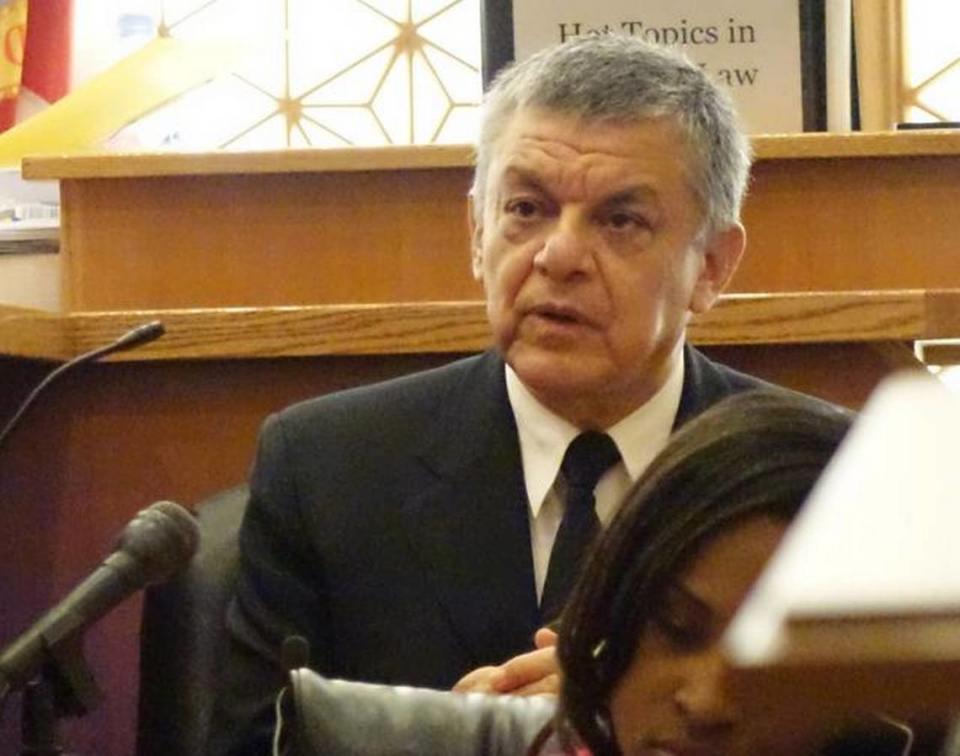British millionaire Krishna Maharaj, imprisoned for 1986 Miami murders, loses another appeal
Krishna Maharaj, a convicted murderer whose claim of innocence has long been championed by British politicians and media despite a wealth of evidence against him, won’t be getting a new hearing in Miami federal court after all.
A federal judge on Monday reversed herself, deciding against allowing another hearing for Maharaj, now 81, who was convicted of a bloody double murder inside a downtown Miami hotel in 1986.
For years, his lawyers have insisted that cocaine kingpin Pablo Escobar and the Colombian cartel were behind the murders, and worked with corrupt police in an elaborate plot to frame Maharaj. State prosecutors maintain the theory is nothing more than a far-fetched fantasy.
Maharaj’s case has been featured frequently in British documentaries, and in stories by news agencies. In April, a senior member of the United Kingdom Parliament, Sir Peter Bottomly, wrote in an opinion piece for the Sun Sentinel that Maharaj, amid the threat of COVID-19, should be released after “serving 33 years for a crime he did not commit.”
Several months ago, U.S. Magistrate Judge Alicia Otazo-Reyes had agreed to hold another hearing. But after hearing arguments last month from defense lawyers and state authorities, she decided that there was not enough evidence to reopen his claims.
Maharaj’s lawyers, Miami’s Ben Kuehne, and Clive Stafford Smith, of the British human-rights organization Reprieve, did not return requests for comment on Monday.
For decades, higher courts have consistently upheld his conviction. A British citizen, Maharaj is a former millionaire who hailed from Trinidad and Tobago and owned a string of champion race horses.
At Maharaj’s original trial in 1987, a Miami jury heard that Maharaj — locked in a bitter business dispute with his ex-business partner, Derrick Moo Young — lured the man and his son, Duane, to the Dupont Plaza Hotel before gunning them down. He was convicted and sent to Death Row, although his sentence was eventually changed to life in prison.
After years of failed appeals, a Miami-Dade circuit judge in 2014 allowed him a hearing to explore claims that the Colombian cartel, with help from corrupt Miami police, orchestrated the murders and framed Maharaj.
In that hearing, two former cartel associates from Miami’s infamous “Cocaine Cowboys” era testified that now-dead kingpin Pablo Escobar might have ordered the murders — although neither man could positively identify the Moo Youngs as the supposed targets of his anger.

Circuit Judge William Thomas ruled that much of their testimony was rife with hearsay that could legally never be admitted before a jury. Maharaj also relied on the testimony of a disgraced ex-Miami cop, who is now in prison for kidnapping and who said that a former colleague — now dead — suggested that Maharaj might have been framed. Thomas found him “totally unreliable.”
“The claim that corrupt police officers framed Mr. Maharaj is preposterous,” Thomas wrote.
In his 13-page order, Judge Thomas also noted that Maharaj’s fingerprints were found all over the hotel, including on a “Do Not Disturb” sign, two newspapers and an empty soda can. Hotel employees also testified that Maharaj was the one who rented the suite.
And perhaps most damning of all was the testimony of an associate who saw and described the killings in detail. Witnesses also told jurors that Maharaj, at a Denny’s diner after the homicides, tried to get them to concoct an alibi.
Maharaj’s lawyers lost a state appeal of the ruling in 2016, and then turned to the federal courts, saying more witnesses might support the claim the cartel was to blame. The state objected, saying the claims were the same ones already hashed out in state court and there was still no evidence that police and prosecutors, at the time of Maharaj’s original trial, knew of any allegations of a “frame-up.”
In a statement released on Monday, Miami-Dade State Attorney Katherine Fernandez Rundle said the Moo Young family “has had to endure a continual stream of extraordinary claims and unverifiable ‘facts’ made in an attempt to free Mr. Maharaj.”
“This has only added to the lifelong tragedy suffered by the members of the Moo Young family,” the statement read. “The decision of the court to reverse itself and rule against holding another ‘new’ federal evidentiary hearing in this case is important to the family and to the people of the State of Florida.”

